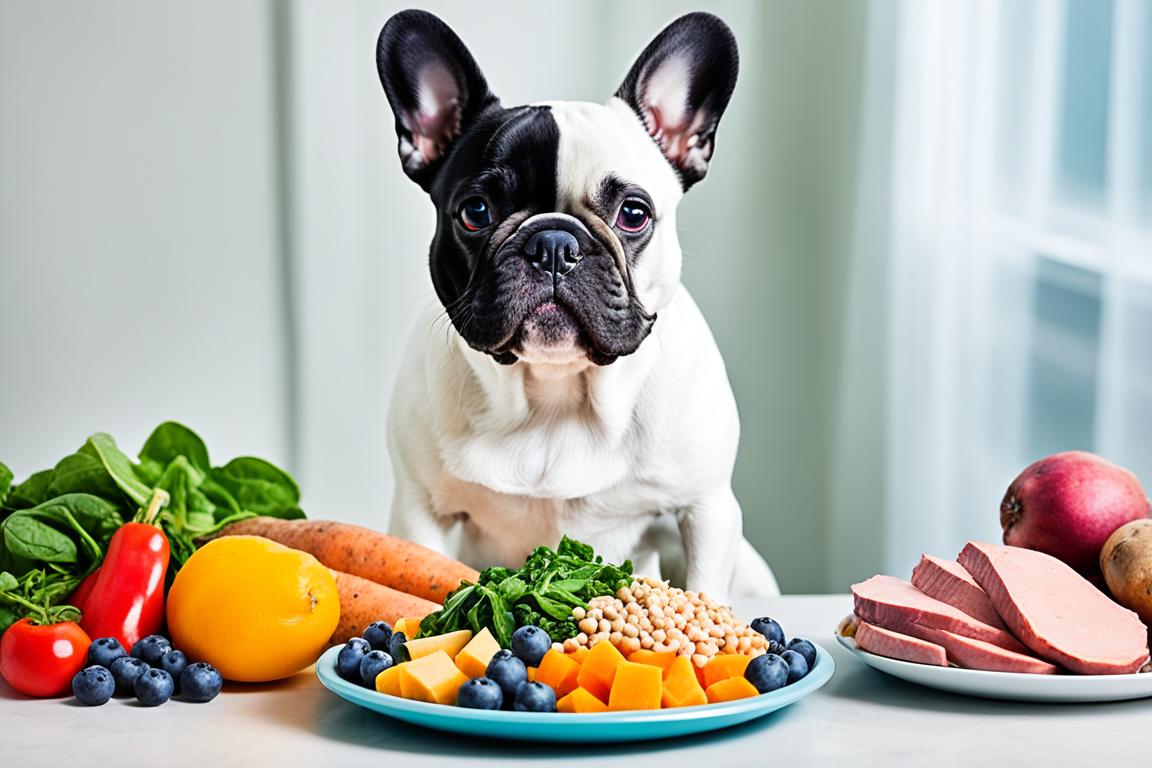
As a proud pet parent of a French Bulldog, I’m always tuned into the unique needs of my charming companion. Understanding the dietary sensitivities in French Bulldogs is crucial since their adorable demeanor often masks their predisposition to certain food-related issues. Like many Frenchie owners, I have learned that staying vigilant about French Bulldog allergies and potential food intolerance is a non-negotiable aspect of their care.
Navigating the waters of pet nutrition, I’ve found that it’s not just about feeding; it’s about nurturing. With each meal, I consider how it impacts their moderate energy levels, muscular health, and overall well-being. Ensuring they have access to fresh water is equally essential to their diet, maintaining hydration, aiding digestion, and helping with nutrient absorption—a critical, yet often overlooked aspect of their health.
Whether you’re new to the breed or a seasoned Frenchie aficionado, this guide will share insights into creating a meal plan that aligns with the breed’s distinctive health profile.
Key Takeaways : French Bulldogs Dietary Sensitivities
- Identify and accommodate the distinctive dietary sensitivities in French Bulldogs for optimal health.
- Recognize and manage French Bulldog allergies through careful monitoring of their diet.
- Appreciate the significance of a balanced diet to prevent any health issues arising from French Bulldog intolerance.
- Stay informed about the nutrients essential for a Frenchie’s health, such as high-quality proteins, fats, and carbohydrates.
- Never underestimate the importance of hydration and its role in your French Bulldog’s diet and digestion.
- Decoding the Balanced Diet for French Bulldogs
- French Bulldog Dietary Needs and Life Stage Nutrition
- Dietary Sensitivities in French Bulldogs
- Common Health Issues Influenced by Diet
- Determining the Right Feeding Schedule and Portions
- Selecting the Appropriate Food Types
- When to Consider Dietary Supplements
- Identifying and Managing Food Allergies and Intolerances
- Human Foods: Do’s and Don’ts for Frenchies
- Conclusion: French Bulldogs Dietary Sensitivities
Decoding the Balanced Diet for French Bulldogs
When it comes to French Bulldog nutrition, understanding the intricacies of a balanced diet is pivotal for maintaining their well-being. This holds especially true given the breed’s proneness to digestive issues and specific French Bulldog dietary needs. A conscientious approach to their daily intake not only supports their physical health but also combats potential French Bulldog health concerns and food sensitivities.
Key Nutrients for Frenchie Wellness
A well-rounded diet for a French Bulldog should address all the essential nutritional bases, including proteins, fats, carbohydrates, and of course, water. The quality and quantity of these nutrients must be tailored to combat common French Bulldog food sensitivities and to promote a vibrant, energetic companion.
High-Quality Proteins and Their Importance
Proteins are the building blocks of a French Bulldog’s muscle mass, thus making it essential to provide them with high-quality protein sources. Foods such as chicken, fish, and lean meats supply these vital nutrients efficiently.
Understanding Fats: Quantity and Quality
Fats play a critical role in a Frenchie’s diet, but striking the right balance is crucial. Both omega-3 and omega-6 fatty acids contribute to the health of their coat and provide a concentrated source of energy.
Carbohydrates for Energy and Digestive Health
While protein and fats might seem the stars of the dietary show, carbohydrates are not to be overlooked. Fruits, vegetables, and well-cooked whole grains grant a French Bulldog the energy they require daily, alongside amplifying their digestive wellness.
Hydration: The Overlooked Nutrient
Hydration is a cornerstone of any canine’s diet, and French Bulldogs are no exception. An ample supply of fresh water assists in digestion and helps flush out toxins, thus supporting overall health and staving off potential digestive issues in French Bulldogs.
| Nutrient | Benefits | Recommended Sources |
|---|---|---|
| Proteins | Muscle maintenance, Immune support | Chicken, fish, lean beef |
| Fats | Energy, Coat health | Flaxseed, fish oil, poultry fat |
| Carbohydrates | Energy, Digestive health | Brown rice, barley, certain fruits |
| Water | Hydration, Toxin elimination | Clean, fresh water sources |
French Bulldog Dietary Needs and Life Stage Nutrition
As a devoted French Bulldog owner, I understand that providing the right nutrition is crucial to my furry friend’s well-being. French Bulldogs have specific French Bulldog dietary needs, which can significantly vary across different life stages. Tailoring their diet to meet these dynamic nutritional demands ensures they remain healthy and happy at every age.
Nutritional Focus for Growing Puppies
The puppy phase is all about growth and development. Those little bundles of energy not only require more calories but also need nutrient-rich food to build strong bones and muscles. I always recommend high-quality puppy formulas that are dense in essential nutrients to anchor their growth and avoid any food sensitivities common to the breed.
Adult Maintenance: Balancing Intake and Output
When Frenchies reach adulthood, their French Bulldog nutrition should shift toward maintaining their ideal body condition. My goal is to prevent obesity, which is why I carefully measure their meal portions and adjust to their energy levels. A balanced diet with the right amounts of proteins, fats, and carbohydrates tailored to their specific activity level is key to sustaining their adult health.
Senior Frenchie Health and Dietary Adjustments
As French Bulldogs grow older, they may not be as active as they once were, which can lead to weight gain and strain on their joints. That’s when I turn to a senior-specific diet. These diets are generally lower in calories but higher in fiber, and still enriched with critical nutrients such as omega-3 fatty acids to support joint health and cognitive function. It’s a delicate balance, but essential to address the typical french bulldog health concerns of our aging companions.
From playful puppies to dignified seniors, our French Bulldogs rely on us to provide them with nourishment that not only fills their stomachs but also fuels their health. By understanding the changing French Bulldog food sensitivities and nutritional needs at each life stage, I can ensure my four-legged friend enjoys a diet that supports a long, joyful life by my side.
Dietary Sensitivities in French Bulldogs
As a French Bulldog owner, I am acutely aware of the dietary trials and tribulations faced by our lovable companions. Recognizing the early signs of food sensitivities in Frenchies can be crucial in preventing serious French Bulldog health concerns. Common indicators include gastrointestinal disturbances and skin flare-ups, which call for an immediate evaluation of your Frenchie’s diet.
One of our primary roles as pet parents is to ensure the fulfillment of our French Bulldog dietary needs. This responsibility intensifies when confronted with a Frenchie displaying signs of French Bulldog food sensitivities. To tackle these sensitivities, a methodical approach is paramount. Not all Frenchies will react the same way to the same foods, which is why personal observation is indispensable.
Discovering the dietary triggers is akin to a detective’s investigation, but once you’ve pinpointed the problem, the solution—a targeted diet—can vastly improve your French Bulldog’s quality of life.
Let me guide you through the listing of potential allergens and share how to create a hypoallergenic diet that may alleviate your furry friend’s discomfort:
- Avoid common allergens like corn, wheat, soy, and beef.
- Opt for novel protein sources your Frenchie hasn’t been exposed to before.
- Incorporate easily digestible carbohydrates such as brown rice or sweet potatoes.
- Consider integrating a probiotic supplement to support gut health.
Remember, consulting with your vet before altering your French Bulldog’s diet is crucial—they can provide valuable insights and supervision throughout the process.
| Potential Allergen | Common Reactions | Hypoallergenic Alternatives |
|---|---|---|
| Beef | Skin rash, diarrhea | Venison, Duck |
| Dairy | Gas, hives | Plant-based milks, Specialized lactose-free products |
| Grains | Itching, ear infections | Grain-free kibble, Legumes |
| Chicken | Chronic licking, indigestion | Turkey, Fish |
Adopting a diet rich in hypoallergenic ingredients can be a turning point for a Frenchie suffering from dietary sensitivities. It’s heartening to see their vitality restored and their playful spirits reborn when their nutritional needs are met without the presence of irritants. My own journey with my French Bulldog has taught me the value of patience and due diligence in customizing a diet that works best for their unique constitution.
Common Health Issues Influenced by Diet
When it comes to the well-being of French Bulldogs, their diet plays a significant role in mitigating several health concerns that are inherent to the breed. Understanding these health issues and how they correlate with dietary choices is critical for maintaining the vitality and happiness of these cherished companions. Let’s explore the most prevalent health issues that can be managed or even prevented by a carefully tailored diet.
Combating Obesity with Appropriate Feeding
For French Bulldogs, obesity can lead to a host of complications, putting undue stress on their bodies. That’s why I focus on a diet that’s low in unnecessary calories and fats, while also ensuring they get plenty of exercises. It’s a balancing act to keep them at an optimal weight without sacrificing the nutrition they need to thrive.
Brachycephalic Syndrome: Eating for Easier Breathing
Given that French Bulldogs are brachycephalic, with short noses and flat faces, breathing can be a challenge. I always recommend diets that are easy to eat and digest, reducing the risk of exacerbating Brachycephalic syndrome and ensuring that mealtimes don’t lead to unnecessary respiratory distress.
Joint Health Concerns and Nutritional Support
Their adorable stout frame also means French Bulldogs are prone to joint health concerns. I suggest enriching their diet with glucosamine and omega fatty acids to support joint health and mobility, possibly preventing the onset of conditions such as hip dysplasia and arthritis.
Preventing Allergies Through Diet
French Bulldog allergies can manifest through skin conditions, which is why I can’t stress enough the importance of hypoallergenic foods. These foods are less likely to trigger allergies and can contribute to a healthier coat and skin, keeping our Frenchies looking as good as they feel!
Determining the Right Feeding Schedule and Portions
My fellow French Bulldog aficionados, crafting the right feeding schedule and ensuring portion control are critical steps in addressing the unique French Bulldog dietary needs. Twice daily feeding is the magic number—a rhythm that helps our beloved Frenchies efficiently metabolize their food and keep their energy levels steady throughout the day. As your Frenchie grows and its activity level changes, do remember that portion sizes might require some tailoring to steer clear of overfeeding and combat the risk of obesity.
To give you a better grasp of how French Bulldog nutrition should be managed, here’s a thoughtful guide to portion control, adapted for your furry companion’s age and lifestyle:
| Age | Puppy (Under 6 Months) | Adult (6 Months to 8 Years) | Senior (8+ Years) |
|---|---|---|---|
| Daily Food Quantity | 25-30 grams per lb of body weight | 20-25 grams per lb of body weight | 15-20 grams per lb of body weight |
| Feeding Frequency | 3-4 times a day | 2 times a day | 2 times a day |
| Energy Level | High | Moderate | Low |
When considering French Bulldog food sensitivities, which can range from mild to severe, adjusting the regular diet to exclude irritating ingredients becomes an essential part of the feeding plan. If you notice any signs of discomfort or adverse reactions post-meal time, consult with your vet—a tailored diet or hypoallergenic formula may be the way to go!
Ultimately, close observation and understanding your French Bulldog’s reactions to different foods are key. Remember, your furry friend relies on you for their well-being. A happy tummy leads to a happy Frenchie. So go forth, use this knowledge wisely, and tailor those meals to perfection!
Selecting the Appropriate Food Types
Deciding on the right diet for my French Bulldog is more than a matter of personal preference; it’s about addressing their French Bulldog nutritional needs, understanding French Bulldog dietary sensitivities, and avoiding potential French Bulldog allergies. With options like Kibble, Wet Food, and the Raw Diet, making an informed choice requires a thorough comparison and consideration of my dog’s specific health requirements.
The Kibble Conundrum: Pros and Cons
When it comes to convenience and promoting dental hygiene, dry kibble stands out as a top option. Its crunchy texture works wonders in reducing plaque and is an excellent source of nutrition when specifically formulated for French Bulldogs. Nevertheless, if not selected with care, kibble can sometimes lead to dietary sensitivities due to the variety of ingredients used.
Debating Wet Food Versus Dry Food
Wet food can be a tantalizing alternative, often more aromatic and flavorful, which can be beneficial for fussy eaters. High moisture content is another advantage, aiding in hydration. On the downside, wet food tends to be pricier and less effective at cleaning teeth than kibble. Moreover, it’s crucial to select brands that formulate wet food tailoring to a French Bulldog’s delicate diet.
To Raw or Not to Raw: A Raw Diet Debate
The Raw Diet appeals to those seeking to mimic the ancestral eating habits of dogs. Proponents argue that it leads to shinier coats, healthier skin, and more energy. However, a raw diet involves a risk of bacterial contamination and must be formulated correctly to meet all of my Frenchie’s dietary needs, which means considering the possibilities of sensitivities and allergies. This approach demands a significant commitment to preparation and knowledge about safe handling practices.
| Food Type | Benefits | Drawbacks | Considerations for French Bulldogs |
|---|---|---|---|
| Kibble | Convenient, Dental benefits | Possible sensitivities due to ingredients | Choose blends specific to French Bulldog dietary requirements |
| Wet Food | Flavorful, High moisture | Higher cost, Less dental cleaning | Select high-quality brands with breed-specific formulas |
| Raw Diet | Mimics natural diet, Potential health benefits | Risk of bacteria, Complex preparation | Balance diet properly, manage any sensitivities |
In the end, whether I decide on kibble, wet food, or a raw diet, the priority is always my French Bulldog’s health and happiness. Recognizing and catering to their unique dietary needs can lead to a more vibrant and fulfilling lifestyle for them.
When to Consider Dietary Supplements
Every conscientious French Bulldog owner knows that tailoring their pet’s diet to their unique French Bulldog dietary needs is crucial for maintaining good health. But even the most balanced diets may occasionally fall short. That’s where dietary supplements come into play, providing targeted nutrition to support your Frenchie’s body in areas that need a little extra attention. Always remember—consulting with a veterinarian prior to starting any supplements can help you determine what’s best for your furry friend.
Supporting Joints with Glucosamine and Chondroitin
Due to their sturdy build, French Bulldogs can be prone to joint troubles, which makes glucosamine and chondroitin supplements worth considering. These compounds are known to support joint health and can be particularly beneficial for Frenchies experiencing stiffness or discomfort.
Essential Fatty Acids for Coat Health
Omega-3 fatty acids aren’t just good for humans—they can do wonders for your Frenchie’s coat, too! By fostering a supple skin and a shiny coat, these fatty acids help your dog look and feel fantastic.
Probiotics for a Healthy Gut
A healthy gut is fundamental to overall health, and that’s precisely where probiotics enter the picture. They aid digestion and promote a balanced gut flora, a must-have for Frenchies with sensitive stomachs.
| Supplement | Benefits | Recommended For |
|---|---|---|
| Glucosamine | Supports joint health and mobility | Adult and senior French Bulldogs with signs of joint discomfort |
| Omega-3 Fatty Acids | Enhances skin health and coat sheen | Any age for coat maintenance and skin conditions |
| Probiotics | Promotes digestive balance and immune health | French Bulldogs with digestive issues or after antibiotic therapy |
Identifying and Managing Food Allergies and Intolerances
As a French Bulldog owner, I’ve learned the hard way that my lovable companion might deal with some French Bulldog food sensitivities. Navigating the world of French Bulldog allergies can be tricky. To keep my Frenchie happy and healthy, it’s important to recognize signs of French Bulldog dietary sensitivities and intolerance quickly.
“Dealing with my French Bulldog’s food sensitivities has been a journey of trial and error, but it’s heartwarming to see the relief and comfort she experiences once we got her diet right.”
It starts with keen observation; subtle changes in behavior or unusual physical symptoms often give the first clue that something isn’t quite right. In our case, it meant consulting a veterinarian who helped us take systematic steps to pinpoint the problem foods.
Here is what I learned about managing these sensitivities:
- Elimination Diets: We started by removing common allergens from her diet and introduced them back one by one.
- Novel Proteins: My vet recommended unique protein sources my dog hadn’t eaten before, like rabbit or kangaroo.
- Hypoallergenic Dog Food: This was a game-changer. These specialized foods are formulated to minimize the risk of an allergic reaction.
Patience is key. Just like humans, every dog is different and reactions to dietary changes may vary. Transitioning to a new food should be gradual, not sudden, to prevent any digestive upsets.
Also, remember to always:
- Consult your vet before making major changes to your dog’s diet.
- Keep a food diary that details everything your Frenchie eats and any reactions they have.
- Understand that dealing with French Bulldog intolerance can be an ongoing process.
Through careful management and attention to my dog’s diet, I’ve been able to reduce her discomfort significantly, contributing to a higher quality of life. While the experience has its challenges, every step towards finding the right balance is worth it for the happiness and health of my cherished pet.
Human Foods: Do’s and Don’ts for Frenchies
As a dedicated French Bulldog owner, I’m always cautious about what treats I can share with my furry friend. While some human foods can be safe and even beneficial, the reality is that many can lead to significant French Bulldog health concerns. Let’s delve into what’s safe and what’s not to ensure the health and happiness of our beloved Frenchies.
Safe Human Food Treats for Your French Bulldog
Wondering which human foods are safe human foods for French Bulldogs? A variety of fruits, vegetables, and proteins can be enjoyed by these little ones in moderation. However, it’s critical to introduce any new food into your Frenchie’s diet gradually to monitor for any adverse reactions.
- Carrots – A great source of vitamins and a crunchy, low-calorie treat.
- Apples (without seeds) – Full of vitamins A and C, which are good for your Bulldog’s skin and coat.
- Pumpkin – Rich in fiber and helps with digestion.
- Lean meats – Turkey, chicken, and beef, cooked without spices or sauces, are excellent protein sources.
Remember to keep these treats as occasional supplements to their diet!
Foods to Avoid: Toxic and Dangerous Options
On the flip side, it’s vitally important to be aware of foods to avoid for French Bulldogs to prevent any toxic reactions. Even a small amount of the following foods can be dangerous, so keeping them out of reach is essential.
| Toxic Food | Reason for Concern |
|---|---|
| Chocolate | Contains theobromine which can be lethal even in small doses. |
| Xylitol | Used as a sweetener in many products, it can cause a rapid insulin release and even liver failure. |
| Grapes & Raisins | Can cause kidney failure even in small quantities. |
| Onions & Garlic | Can cause red blood cell damage and lead to anemia. |
| Coffee or Tea | Caffeine is highly toxic and can lead to nervous system damage. |
| Avocado | Persin, found in avocados, can cause vomiting and diarrhea. |
| Alcohol | Can cause intoxication, leading to weakness, collapse, and even coma. |
Recognizing the safe treats and toxic foods for dogs specifically our French Bulldogs, is a responsibility we must take seriously. It ensures our pets live long, healthy lives. When it comes to offering food from the table, a rule of thumb is: When in doubt, leave it out. Always consult your vet if you’re considering adding a new human food to your French Bulldog’s diet.
Conclusion: French Bulldogs Dietary Sensitivities
As we delve into the nutritional labyrinth of French Bulldog dietary sensitivities, one point is remarkably clear: understanding and attending to the French Bulldog’s nutritional requirements is not just a preference; it is imperative for their vitality and longevity. Throughout this explorative journey, we have discovered that dietary sensitivities in French Bulldogs can manifest in various ways, and proactive management is essential. With this knowledge, I hope to have equipped you with the insight to tailor your French Bulldog’s diet meticulously, addressing any specific food sensitivities and allergies they encounter.
A Comprehensive Guide to Frenchie Food Sensitivities
My mission was to distill the complexities of French Bulldog allergies and food sensitivities into a coherent guide. I endeavored to shed light on not just the “what” and “how” but also the “why” behind each dietary choice. The intricate balance of French Bulldog dietary needs—ranging from high-quality proteins to the necessity of hydrating agents—demonstrates that their diets are not to be assembled haphazardly, but with intention and understanding. The poise with which you navigate their nutrition is pivotal to preventing adverse reactions and fostering a thriving, happy Frenchie.
Partnering with Your Vet: Final Thoughts on Feeding French Bulldogs
My closing thoughts encourage you to think of your vet as an ally in your French Bulldog’s health. Constant, open communication with your veterinary professional ensures that your approach to French Bulldog nutrition reliably aligns with your pet’s ever-evolving dietary requirements. Their expertise will be invaluable as you tailor a specific diet to your Frenchie’s unique needs, making each vet consultation a stepping stone towards your goal—a nourished and content companion by your side. Remember, while this may be the end of the article, it’s just another day in the rewarding journey of caring for your cherished French Bulldog.














